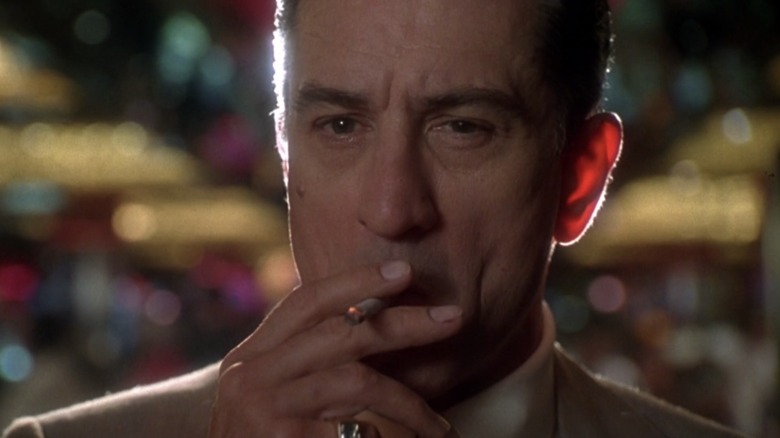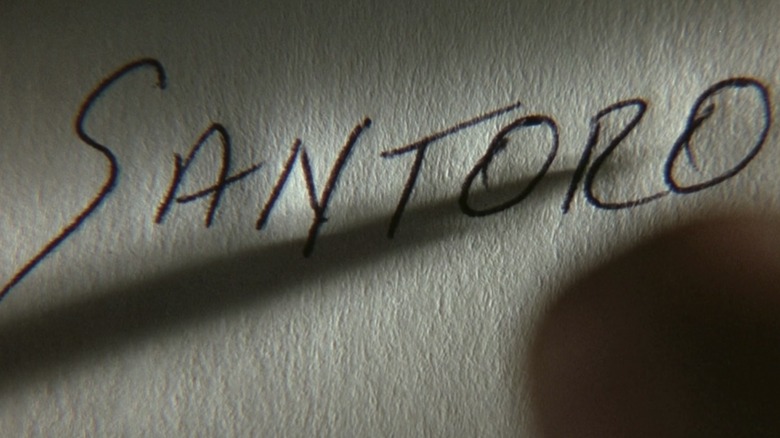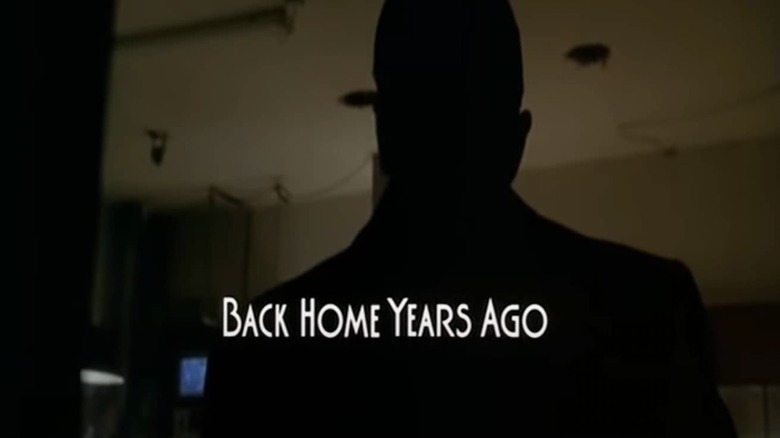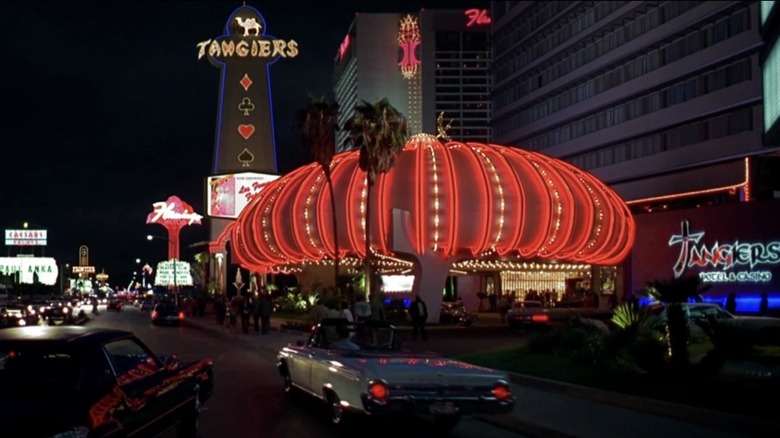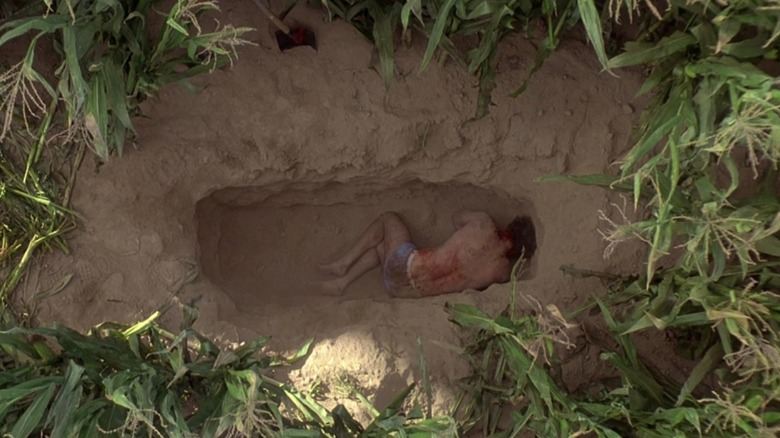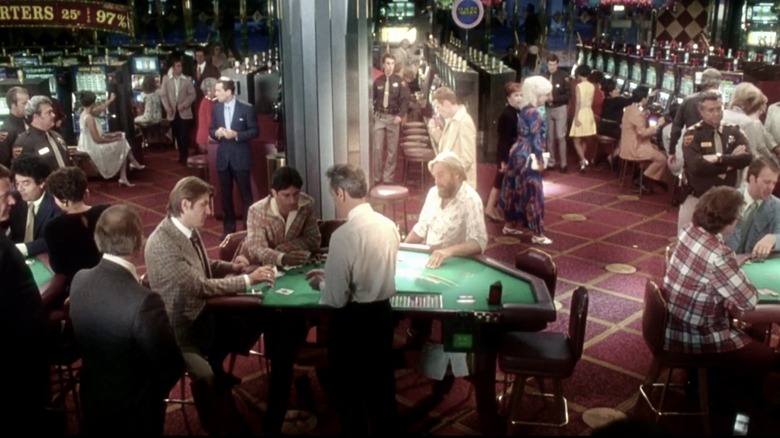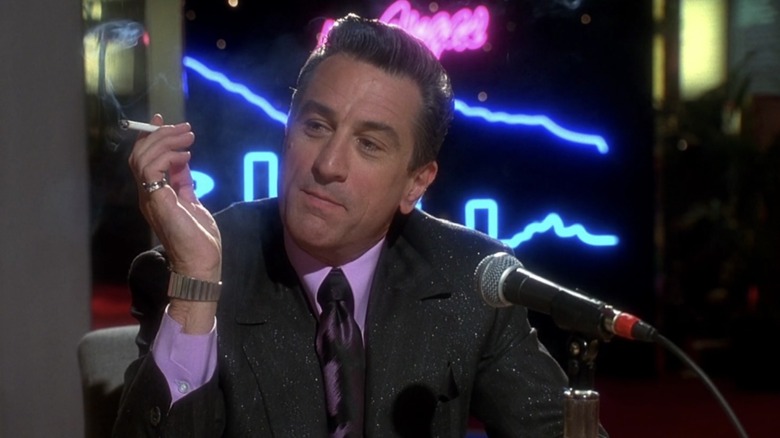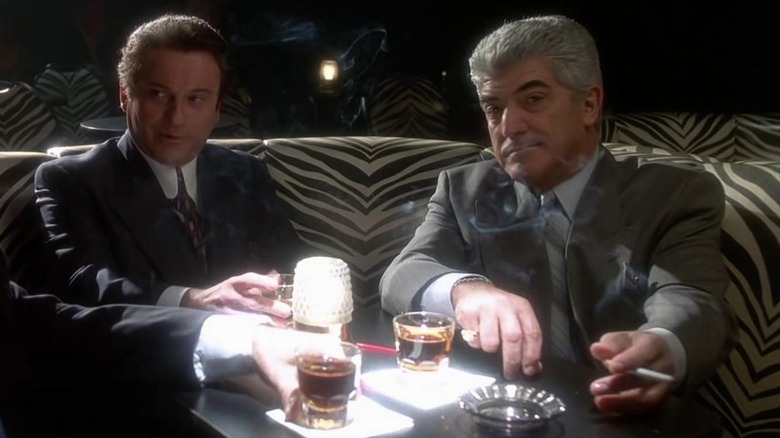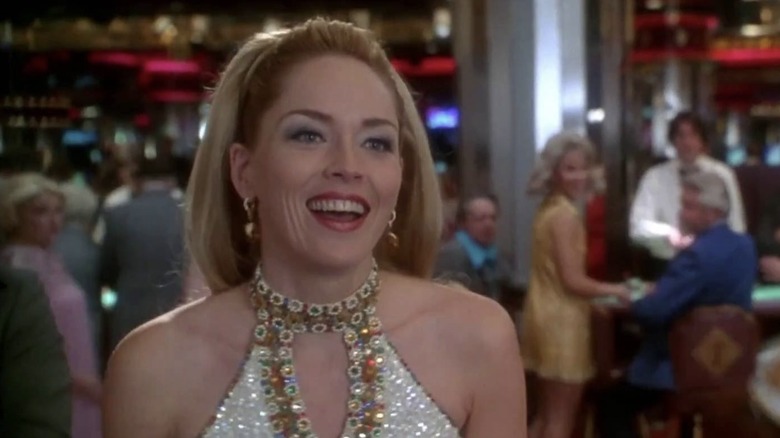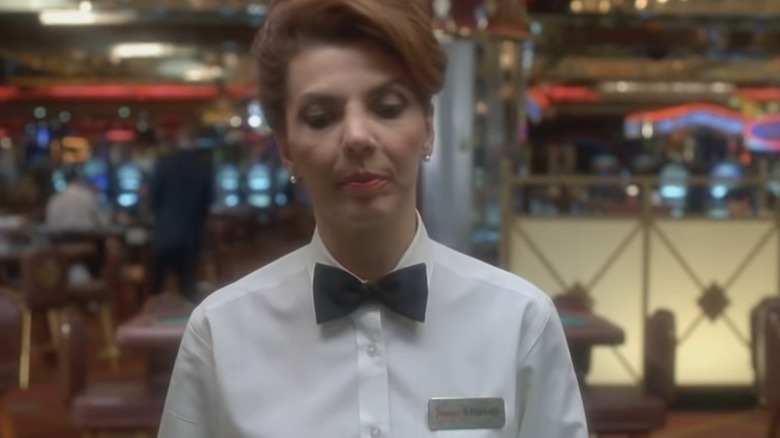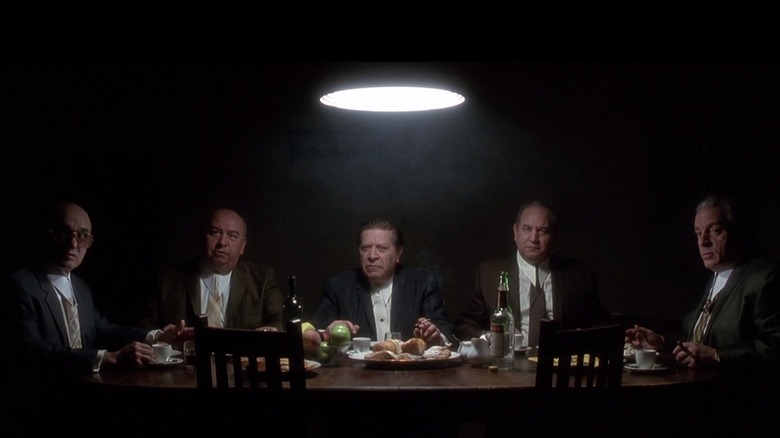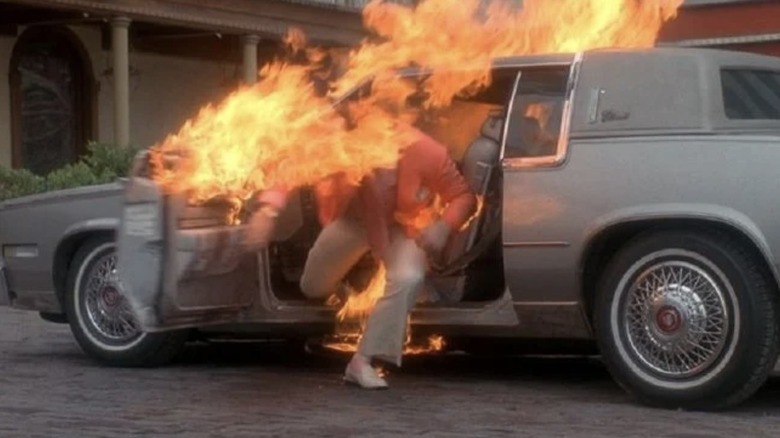Everything Casino Doesn't Tell You About The True Story
Director Martin Scorsese's 1995 film "Casino" was inspired by a true story, with crime reporter Nicholas Pileggi co-writing the screenplay with Scorsese while simultaneously working on the nonfiction book. If you are a Scorsese fan, you probably already know that Pileggi also wrote the novel "Wiseguy" that Scorsese's film "GoodFellas" was based on. Their second project together was a little different than the first, though. Pileggi's book "Casino: Love and Honor in Las Vegas" came out in October and the film was released in November 1995.
This proved challenging for the film's production because unlike "Wiseguy," Pegilli's new book hadn't already been fact-checked and vetted before publication, leaving Scorsese to wrestle with the lawyers at Universal Pictures about what he could and could not include in the film. The lawyer's job was to ensure the studio wouldn't get sued for libel, while Scorsese's job was to make an accurate but engaging movie about gambling and the shadowy underbelly of the industry.
Simon Brew with Film Stories chronicled the tension between Scorsese and Universal's legal department, detailing compromises Scorsese made to get the film made — one of which was saying at the beginning of the film that the story was "adapted from a true story" rather than "based on a true story." This might seem like mere semantics, but these are the hoops Scorsese had to jump through to get this movie made.
Any film inspired by true events will contain minor differences. Sometimes for legal reasons and other times for dramatic effect. As the film's technical advisor Frank Cullotta told Uproxx, "They got to juice it up. It's a movie. Real life is boring." Keep reading if you want to know everything "Casino" doesn't tell you about the true story of how the mob lost control of Las Vegas.
The names were changed for the film
As an act of legal protection against litigation, all names were changed for the film "Casino," even though the main characters had real-life counterparts. This was, of course, because Pileggi's nonfiction book, "Casino: Love and Honor in Las Vegas" could not provide legal protections, since it had not been published before the film began production.
Sam "Ace" Rothstein (Robert De Niro), was based on Frank "Lefty" Rosenthal, a professional gambler widely recognized as a pioneer of sports gambling and a talented handicapper with alleged Chicago mob ties (per Las Vegas Sun). Ginger (Sharon Stone) was based on Geri McGee Rosenthal, the ex-wife and mother of Frank Rosenthal's children (per The Mob Museum).
Nicky Santoro (Joe Pesci) was based on Chicago mobster Anthony "The Ant" Spilotro, and Nicky's mob associate Frank Marino (Frank Vincent) was based on Frank Cullotta (per History vs. Hollywood). The San Diego real estate developer-turned-casino front man Phillip Green (Kevin Pollak) was based on Allen Glick (per Times of San Diego). All Chicago Outfit associates in the film had fictional names as well, but they were indeed based on real men, many of whom went to jail for the skimming scheme.
The film never acknowledges it was the Chicago Mob running casinos in Vegas
This desert city's mob ties go way back, with some calling New York mobsters like Benjamin "Bugsy" Siegel and Meyer Lansky the "founding fathers" of Las Vegas. By the 1970s, it was the Chicago Outfit running things in Vegas. Spilotro, a made-man in the Chicago mob, was sent to Las Vegas in 1971 as an enforcer (per Las Vegas Sun) to ensure their financial interests were being represented.
Despite these publicly recognized ties between the Chicago Outfit and Las Vegas, Scorsese did not refer to mob interests in the film "Casino" as being the Chicago Outfit. This was a legal issue with the studio, as reported by Film Stories. All names were already changed for the film, but the legal department at Universal Pictures wanted the locations changed as well. There is a lot of talk about Kansas City and meeting somewhere in the middle, but Chicago is entirely left out of the film.
Rather than change the name to another city in the Great Lakes region, Scorsese referenced the outfit "back home" as a humorous compromise. We even see this in title cards on screen during the movie. If you're a Scorsese fan, you probably got a chuckle out of this, thinking it a humorous reference to mobsters' penchant for vague language and speaking in code just in case they are being watched by law enforcement and need to establish plausible deniability.
The Tangiers Casino is fictional
As part of Scorsese's concessions to Universal Pictures legal department, De Niro's Sam "Ace" Rothstein ran the fictional Tangiers Casino. The movie was filmed in the Riviera Casino in Vegas rather than on a set to give the scenes an authenticity a set could not provide. Frank "Lefty" Rosenthal actually ran four casinos in Las Vegas. As Rosenthal told PBS in an interview, "We had four properties: four casinos, three hotels that were under an umbrella of the corporation. Our command post was the Stardust Hotel, Fremont Hotel and Casino, Hacienda, and the Marina."
The corporation Rosenthal spoke of was the Argent Corporation, run by Allen Glick, a San Diego real estate developer who always maintained he did nothing illegal by getting a loan from the Teamsters to begin his casino empire in the early '70s. As reported by Las Vegas Review-Journal, in 1983, Glick was granted full immunity as a cooperating witness for the prosecution against the 15 men charged for their casino skimming scheme.
Despite owning the four casinos, Glick turned daily operations over to Rosenthal, who ran things without a license from the Nevada Gaming Commission. For years, Rosenthal changed his job title regularly to avoid detection, but regardless of his title, he was running things at the four casinos the Argent Corporation owned. In 1976, this scheme caught up to Rosenthal, and they officially denied him a license. Las Vegas attorney Jeff Silver said, "That was the beginning of the end for the mob" in Las Vegas (per Las Vegas Review-Journal).
Nicky and Dominic Santoro's real-life counterparts were not beaten to death in a cornfield
The deaths of Nicky and Dominic Santoro in "Casino" make for one of the most brutal death scenes on screen. The brothers meet mob associates in a secluded cornfield, where they are beaten with baseball bats within an inch of their lives before being unceremoniously stripped to their underwear and buried alive. This is a gruesome death, but it is not what actually happened.
Scorsese and Pileggi had no way of knowing what really became of the character's real-life counterparts, Anthony and Michael Spilotro, because the full details of their murders were not revealed until long after the film came out. In 1986, their bodies were found and identified in an Indiana cornfield, and, as reported by the Los Angeles Times, "Investigators suspect[ed] that the two men 'died at or near' the grave." This led Scorsese and Pileggi to envision the violent end for the brothers that is seen in the film.
What really happened to the Spilotro brothers only became publicly known in 2007 during the "Family Secrets" mob trial. The brothers were lured to a basement in the Bensenville neighborhood, near the Chicago airport, under the false pretense Michael would become a "made man," as reported by the Wednesday Journal. The Spilotro brothers' family testified both men suspected it was a trap. Meanwhile, Nick Calabrese testified that the Spilotro brothers were killed by a group of mobsters in the basement, and they transported their corpses to the Indiana cornfield where the brothers were buried.
The Nevada Gaming Commission blacklisted Frank Lefty Rosenthal
In "Casino," Nicky Santoro is banned from all casinos when the Nevada Gaming Commission adds his name to the dreaded Black Book. This is a response to his involvement with the casinos as a mob enforcer in Las Vegas. In the film, Nicky doesn't take this kindly, believing he is above the law and should not be excluded from the casinos because of his mob ties. Similarly, Santoro's real-life counterpart Spilotro was also added to the Black Book in 1979, and per the Las Vegas Sun, was only removed after his death, proving this banishment is a lifelong condition.
In real life, Rosenthal was also banned from casinos in Nevada. They added Rosenthal to the Black Book in 1987, years after losing his court battle to get a gaming license. Rosenthal continued to fight to have his name removed from the Black Book and succeeded in a district court in 1990, but in 1991, the Nevada Supreme Court reversed this decision and his name remained in the Black Book until his death in 2008 (per Nevada NewsMakers).
By the '90s Rosenthal had already moved away from Las Vegas, but he just couldn't let his grudge match with the Nevada Gaming Commission go until the Nevada Supreme Court laid down their verdict. Despite being blacklisted in Nevada, Rosenthal admitted he still snuck into casinos in disguise as he shared in an interview, "I sure do — to see what's going on. But I haven't been to Vegas in three years."
Frank Rosenthal did host a talk show, but he never juggled
In Scorsese's "Casino," after being denied a gaming license by the state of Nevada, Ace hosts a talk show out of the Tangiers, going against the Chicago Outfit's suggestion that he keep a low profile. He justifies the decision by saying it is a way for him to have a platform to advocate for his application for a gaming license being reconsidered, and it gives him a legitimate reason to hang around the casino he is running without the proper paperwork.
As absurd as this sounds, in real life, Rosenthal actually did host "The Frank Rosenthal Show" in 1977 from the Stardust hotel. In an interview, he said, "that still angers me when I think of it — I never juggled on 'The Frank Rosenthal Show.' I resent that scene. It makes me look foolish. And I only did that TV show on the behest of the chairman of the board of the Stardust so that the public would realize I was a decent guy and not a mobster as portrayed by the media covering us at the time."
It's funny that out of all the nefarious things Rosenthal stood accused of — including mob ties, bookmaking in Miami, and alleged ties with an anti-Castro militant group in Miami lead by Luis Posada Carriles (per New York Times) — it was being misrepresented as juggling on television that really upset Rosenthal. This was a guy who clearly took himself seriously and wanted others to do the same.
Frank Cullotta ran the Hole in The Wall Gang
Cullotta, the real-life counterpart to Santoro's right-hand man Frank Marino (Frank Vincent), actually ran the robbery crew called the Hole in the Wall Gang portrayed in the film "Casino" as Nicky's operation. Santoro's real-life counterpart Spilotro didn't take part in the robberies as Santoro is depicted doing in the film, but in real life, Cullotta did give Spilotro a cut of the profits from the crew's illegal activities (per Deadline).
In a 2015 with Uproxx, Cullotta said after moving to Las Vegas, Spilotro gave Cullotta the OK to set up a crew, telling Cullotta, "Just make sure I get a percentage. I don't want to meet your crew. I don't want to know who they are. I'll tell you what I want them to do. I'll never give them any orders directly, they'll be coming through you. And anytime you got any monies to give me, you give me directly."
Cullotta and Spilotro grew up together and began their life of crime together as young men in Chicago. Cullotta told Upproxx, "I became friends with Tony, and we started hanging together, and robbing together, and doing everything together." But after a failed robbery attempt led to an arrest, Cullotta turned state's evidence when he suspected Spilotro had put a hit out on his name. Cullotta was in the Witness Protection Program at one point, but he resurfaced, acting as a consultant for Scorsese's 1995 film, along with running a mob tour company in Vegas and a YouTube channel. Cullotta died at the age of 81 in 2020 due to Covid complications.
Geri McGee Rosenthal had a child before she married Frank
The real-life counterpart of Sharon Stone's character Ginger, Geri McGee Rosenthal, had a daughter before she met Frank Rosenthal. This is one major discrepancy between the true story and the film "Casino." Another discrepancy between the film and the true story is that the Rosenthals had two children together, a daughter named Stephanie and a son named Steven, where as the film depicted the couple sharing only a daughter (per History vs. Hollywood). As a young woman in Los Angeles, Geri's first child, Robin Marmor, was born in 1957 and fathered by Lenny Marmor. James Woods' character in the film, Lester Diamond, is the fictional stand-in for Marmor.
In the film, Sam doesn't understand the hold Lester has on Ginger, blaming it on her drug addiction and history as a sex worker, with Lester acting as her pimp. In reality, Geri Rosenthal shared a child with Lester's counterpart, making a much more nuanced explanation for her continued communication and relationship with Marmor (per History vs. Hollywood).
Geri Rosenthal moved from Los Angeles to Vegas in the early '60s with her daughter, working as a cocktail server and a showgirl at the Tropicana before becoming a chip hustler, entertaining high-rollers at casinos in Las Vegas. The Rosenthals married in 1969 and divorced in 1981, and she died in Los Angeles in 1982 due to an apparent overdose.
If you or anyone you know is struggling with addiction issues, help is available. Visit the Substance Abuse and Mental Health Services Administration website or contact SAMHSA's National Helpline at 1-800-662-HELP (4357).
Frank Rosenthal was the first casino manager on the strip to employ female dealers
Frank Rosenthal remains a Las Vegas legend, not just because of his alleged mob ties, but because of his contributions to casino management and gambling innovations. The 1995 film "Casino" discusses how Rothstein, Rosenthal's fictional counterpart, brought sports bookmaking into casinos, making it a legitimate, legal form of gambling. But there is another innovation Rosenthal was responsible for that was left out of the film: Rosenthal was the first casino manager on the Vegas strip to hire female dealers. While we do see a female dealer in the film, audiences aren't told that this is a progressive hiring policy for the time (per The Guardian).
In an interview Rosenthal said, "There was this old-world mentality that women couldn't do the job — that they were only good enough to serve cocktails or be showgirls — which was nuts. When we had female dealers it increased the pot instantly. It was a no-brainer: You are a guy? Who would you rather have in front of you as a dealer? Women proved to be our best dealers from the start. We made more money. They were better dealers. They knew men and how to handle them. And men didn't seem to mind losing more to them."
The first female baccarat dealer on the strip was Shirley Brancucci, who worked at the Tropicana as a cocktail server before becoming a dealer at the Stardust. She said, "Frank Rosenthal, he was very, very, 'You better do what I say.' He had a big, big ego," suggesting that despite being progressive in his hiring policies, Rosenthal was still a demanding boss as we see reflected in the film's version of him.
Frank Lefty Rosenthal was never arrested or indicted in connection with Las Vegas skimming
Despite Rosenthal's alleged mob ties, he always maintained that he was not a part of the Chicago Outfit running Vegas in the '70s, saying in an interview, "I was never a part of them, but I made it a point not to burn any bridges. I don't see any purpose in burning a bridge." Rosenthal also maintained he did not know about the skimming operation happening in the Las Vegas casinos he managed for the Argent Corporation. As he stated in the same interview, "Negative. If I did, they should have charged me. But they never did. I learned about it when the indictments took place."
Despite suspicions of his involvement, Rosenthal was never arrested or indicted for the Las Vegas skimming scheme, nor did he testify in the 1986 trial (per Las Vegas Review-Journal). Rosenthal elaborated about never being charged, saying, "If I were guilty I would have been. I submitted myself to endless hours of interviews regarding the skim operation. If they had something, they would have dropped the hammer on me. But they had nothing other than innuendo."
Rosenthal's involvement with the four casinos owned by the Argent Corporation in the '70s is undisputed, and he was known to have friendly associations with mobsters like Spilotor, as well as Joey "The Clown" Lombardo and Frank "The German” Schweihs. However, Rosenthal always claimed his associations with these people were "strictly social."
Allegedly Frank was an FBI informant
Rosenthal also always maintained that he wasn't a snitch. Even after surviving a failed car bombing in 1982, Rosenthal said in an interview, "The Vegas Metro police came at me hard after the bombing to cooperate, and said they wouldn't protect me if I didn't." When asked why he didn't snitch, Rosenthal explained, "It all comes down to style and doing what you feel comfortable with. I never talked about or testified against anyone and never will. An attempt on my life would not change that. I have no regrets."
After Rosenthal's death in 2008, it was reported that Rosenthal was a "top echelon" FBI informant when the Las Vegas Review-Journal cited that three law-enforcement sources to confirm Rosenthal was a long-term informant, even before the 1982 car bombing, whose code name was "Achilles." Of course, no one said anything while Frank was alive, preventing a contract going out on Rosenthal's head. Also, Scorsese did not include this theory in the 1995 film because the information was not readily available at the time.
Despite Rosenthal and his former lawyer Oscar Goodman saying Rosenthal hadn't turned on the mafia, being an FBI informant would explain why Rosenthal was never charged with anything related to mob activities in Las Vegas during the 1970s and '80s. Some of Rosenthal's mob-affiliated associates certainly suspected he was an informant, though; as reported by the Las Vegas Review-Journal, the Kansas City mob representative at the Tropicana, Joe Agosto, was recorded saying Rosenthal was a "snitch" on a wiretap in 1978.
